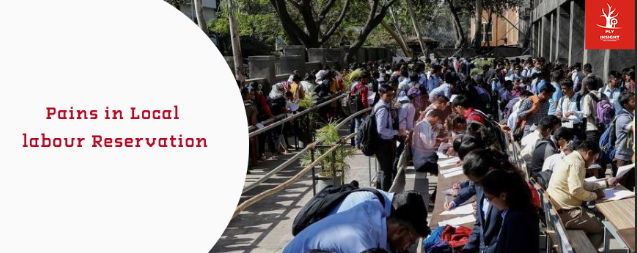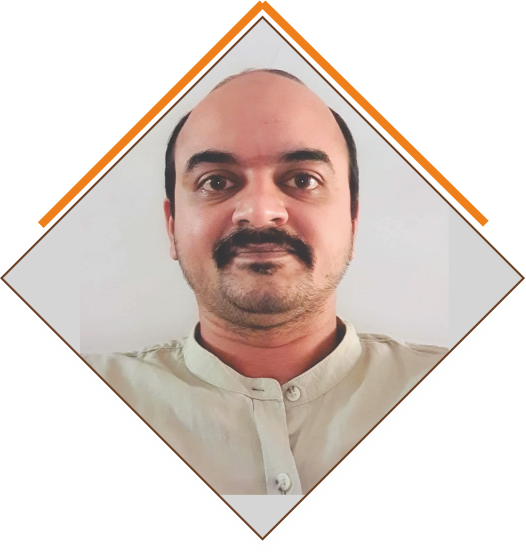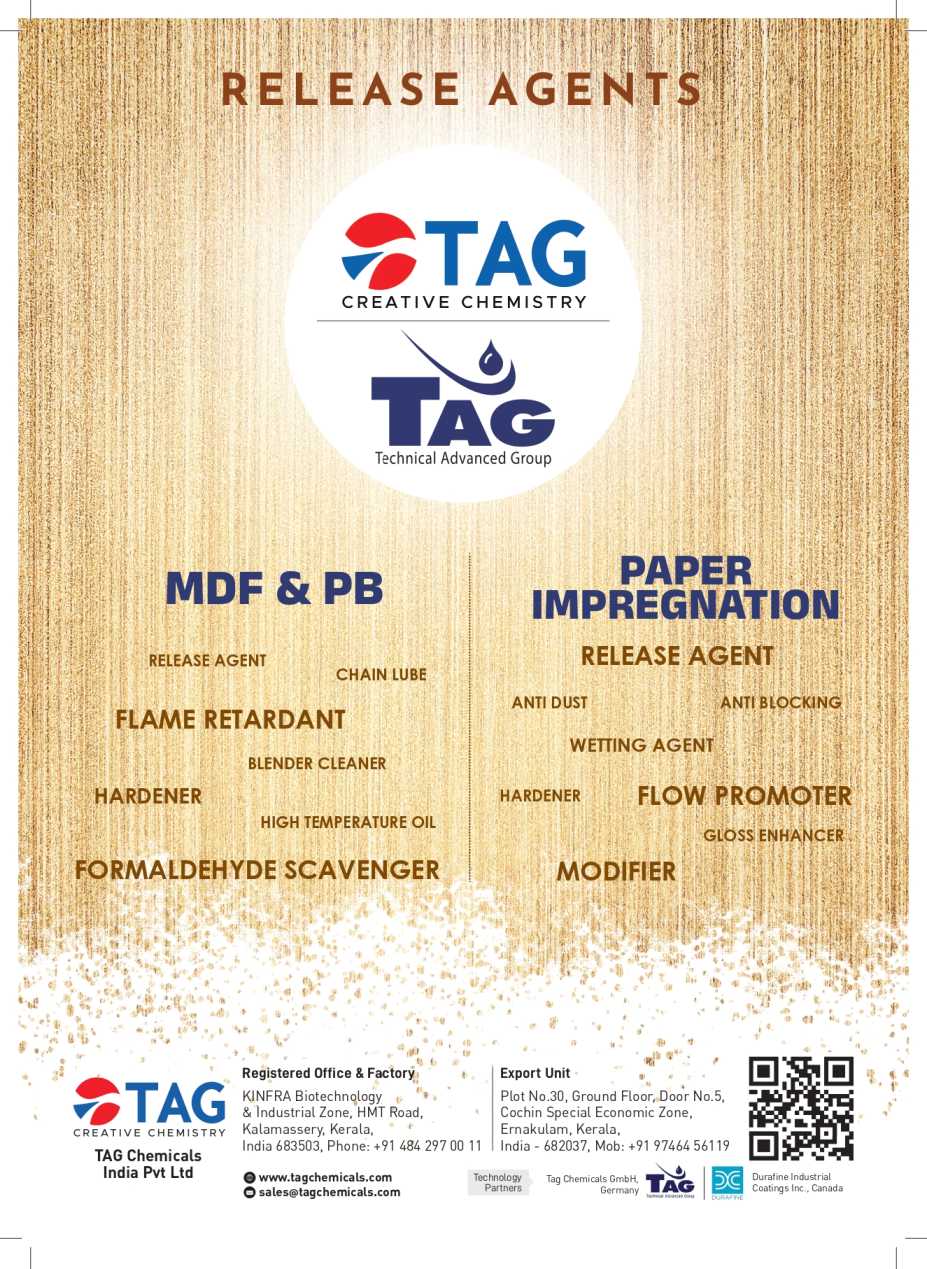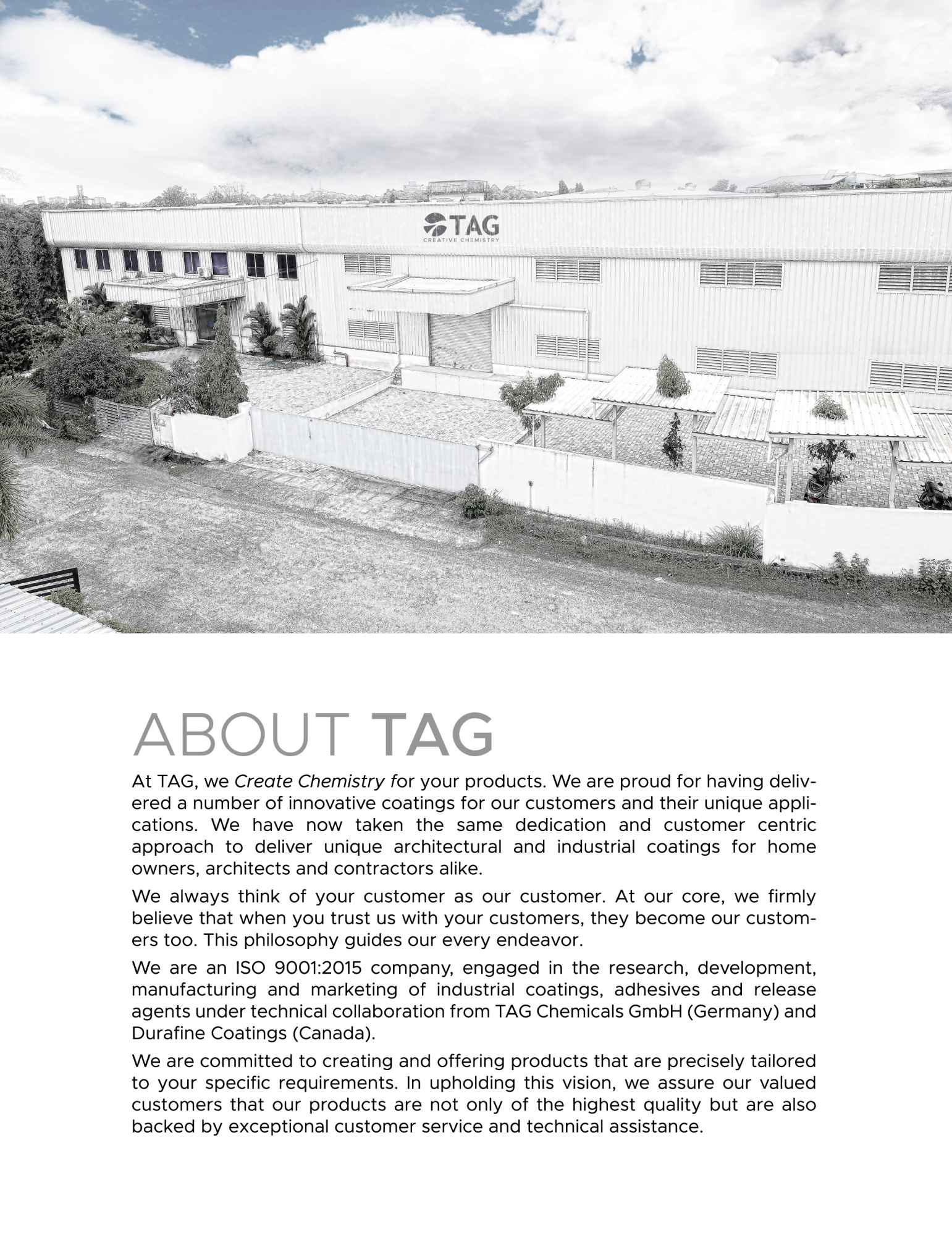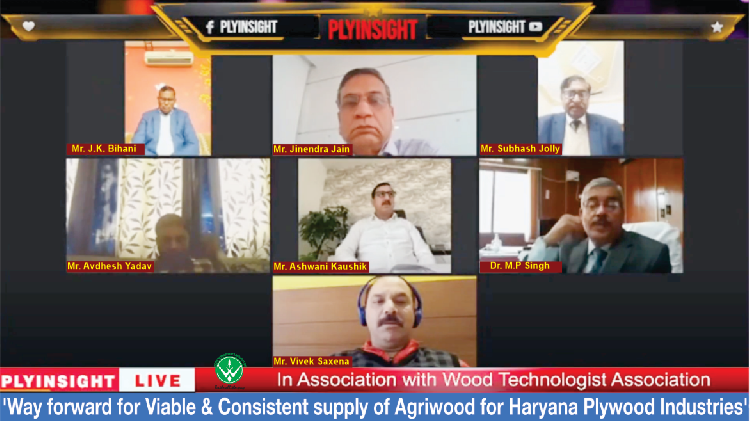
‘Way forward for Viable & Consistent supply of Agriwood for Haryana Plywood Industries’
- मार्च 12, 2022
- 0
FEBRUARY 16, 2022
Honorable Panelists : –
Dr. M P Singh- Director, Institute of wood science & Technology, Bengaluru
Dr. Jagdish Chandra- Head of Forest Force (PCCF), Haryana
Dr. Vivek Saxena- MD, Haryana Forest Development Corporation
Mr. J K Bihani- President, Haryana Plywood Mfrs Association
Mr. Subhash Jolly- President, Wood Technologist Association
Dr. C. N. Pandey- Technical Advisor, Federation of Indian Ply & Panel Industries
Dr. Ajay Thakur- Scientist, Forest Research Institute, Dehradun
Mr. J K Jain- National Head, Plantation & Special Projects, Greenply Ind. Ltd
Mr. Padam Jain- Director, New Pragati Plywood Industries, Yamunanagar
Mr. Ashwani Kaushik- Director, Shree Ram Steel Industries, Yamunanagar
Mr. Rajesh Guliya- IFS, Ex DFO, Yamunanagar, Haryana
Mr. Avdhesh Yadav- Secretary, Wood Technologiest Association
Mr. Vaidyanathan Hariharan- Senior Executive, Wood Technologiest Association & Founder Director, Kalpaka RDF
Mr. Manoj Thakur- Senior Editor, PLY insight
Mr. Suresh Bahety- Founder Editor, PLY insight
Introductory remarks from Shri Subhash Jolly
- In spite of being a wood importing region, the Haryana plywood industry sector is one of the strongest contributors of the sector. It is a matter for great appreciation and recognition.
- However, during the last couple of years, around 30% of the industry is on the verge of closing down. One of the main reasons being lack of sufficient quantity and quality of plantation timber.
- This webinar tries to raise and address the issue in presence of senior officials of respective departments, as well as leading industrialists, advisors & scientists so that we augment our raw material (RM) resources for better quantity & quality. This will lead to better domestic as well as export opportunities, in addition to providing employment to millions of skilled, semi-skilled & unskilled workers.
Mr. Rajesh Guliya:
- WBI is under great pressure with existing imbalances of demand & supply in raw material.
- Request Dr Saxena Saab to review support prices based on current price situations. All supply of RM comes from farmers. Many farmers toppled growing trees because of drastic price fluctuations. When support price also decreases, small farmers as well as small industries take the major heat. Almost 30% of the smaller units had to close down due to their inability to manage the pressure of demand & supply imbalance in RM.
- Request to Dr Jagdish Chandra Saab. After the new forest policy, license regime was loosened, based on surveys & data procured during that time. Yamunanagar used to receive around 2,11,000 lac quintal wood on an average. About 1,50,000 lac quintals used to come from UP & the remaining from other sources. Licenses were issued based on this data. This is not the same case now, and there has been no further requirement and procurement study.
- On an average only around 80,000 quintals are available now based on available market data. With such low levels of wood availability, how are the licenses being given to new units?
- Also, the then PCCF had mentioned that updated studies must be conducted & current data must be obtained on a regular basis. Hon PCCF Saab is requested to look into this kindly & also look into the situation of wood availability when deciding on licenses.
- Regular training of farmers & subsidised supply of QPM used to happen earlier on a regular basis. Kindly update us on the current matters regarding these. PCCF Saab may kindly initiate on these.
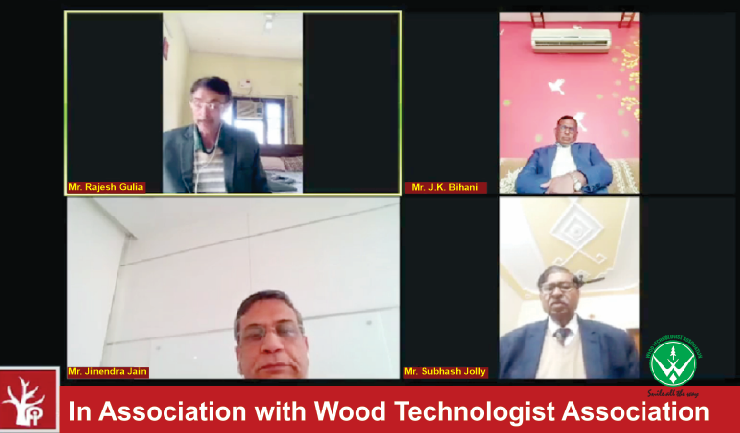
Mr. J K Bihani:
- Lot of licenses issued during the last 5-6 years. There used to be around 250 units earlier, but now the number of industries has increased by 40% or more, after the new licenses.
- But the wood availability is the same.
- Banks are running at peak credit limits & only the well established factories can survive in this scenario. There are lots of cash flow & liquidity issues. Covid has added to the pains.
- In such a scenario, it is important for departments to look at wood availability before providing licenses.
- These days MDF license is also being given which will further worsen the scenario, when farmers start cutting the trees much earlier at 10-11 inches girth.
- Instead of expanding the number of industries, let us initially focus on expanding wood availability & production.
- Also requesting our industry brothers to involve & cooperate towards arriving at better Agriwood output & vailability.
- Meanwhile, 18% GST on farm grown wood similar to consumer goods like electronics is quite out of logic. It is a huge burden on the small farmers, especially since material from such small farmers come through contractors.
- I request the departments to set aside some funds for awareness & augmentation programmes. I hereby also request our industry friends to take part in these aspects.
Mr. J K Jain:
- The problem of wood availability fluctuation remains since decades. It is the same problem time & again.
- We need to change the mindset, and look at it differently with out-of-box thinking.
- Capacity is there, but capacity utilisation is non-existent. Management of capacity is important.
- In a democratic country like ours, each State also has its own problems. For example, the transport ban on eucalyptus from TN to other States, & Karnataka banning eucalyptus plantations etc.
- We need to act on priorities ourselves, because governments can change priorities based on the overall scenario. It will be wrong to assume that WBI will always get 100% priority from the government.
- We have not been able to clearly define lower availability & higher availability. We tend to react & panic with ±5% fluctuations on either side.
- We need to focus on developing new policy for management of wood resources for RM.
- In addition, government can support by providing degraded forest land to Corporation, & the industry can involve with Corporations for plantations.
- There is need to study the requirement specifically. Can go for farm forestry as well as captive plantation. Have to come out from old approaches & come together to bring change systematically.
- How can increase in prices increase material availability? I am not able to understand how increasing prices will generate more RM. In this sector, things don’t happen overnight. It takes a minimum time of the proper felling cycle. Planning is required to overcome the problem.
- We need new industry related policy in Haryana.
Dr. Vivek Saxena, MD, HFDC
- Industries got a good place & a good environment during initial days & PWI flourished, contributing much to the nation as well as farmers’ development through the requirement for wood RM. During that time Haryana was able to remove obstacles on transport of Eucalyptus & Poplar species. Good seedlings were provided due to the initiatives of companies such as WIMCO & ITC.
- Everyone has to come together. Panchayat & community plantation linking must be targeted by the industry.
- Right choice of Species, linkages & buy-back arrangements can be designed by industry stakeholders.
- We need to figure out a way to bring together Government-Industry-Farmers-Research Institutes through a simplified partnership.
- It is good to see that industries are discussing these aspects now in a forum along with relevant stakeholders, with the guidance of Dr. M P Singh & Dr. C N Pandey, & many other experts.
- Regarding utilisation of forest lands for assigning it to Corporations, – Haryana State is already a State with less Forest Cover & as such, there is in fact no dearth of available land for farm forestry.
- Regarding assessment of RM availability as suggested by Shri Guliya, I am open to inputs regarding assessment of data. We may also involve related institutions such as IWST, IPIRTI & FRI.
- Industry can come to us with their capacity needs & inputs.
Mr. Padam Jain:
- License timing is wrong. Everyone knows wood availability is low for Haryana.
- Immediate activity should have been appropriate study of RM availability.
- If things go this way, Yamunanagar industries will go sick.
- Due to low girth timber, wastage is more. Industry alone cannot solve this issue.
- We also have lot of export opportunities. We have been exporting to countries like Singapore, Malaysia, and the Gulf. But freight expenses are a huge set-back.
- Punjab also is facing timber shortage now.
- Addressing the wood availability imbalance is the most important issue.
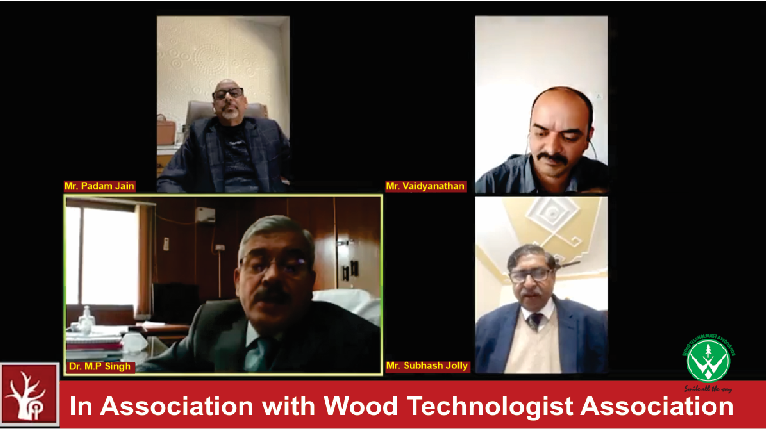
Dr. C. N. Pandey:
- If we cannot measure our requirement, we cannot manage.
- Sometime we feel it is no man’s subject, because no department was interested before to tackle the issues.
- First is to measure capacity of industries & the requirement.
- As Dr. Saxena mentioned, integration of Industry-Departments-Institute-Farmers is very important. Every State should have this integration.
- Time has come that the industry also has to make investments in various approaches for RM development.
- Industry has to make good rapport with farmers, pay right prices & directly approach them.
- Why not the States come out with AF cycles for the industry sectors.
- Long term rotation plantation also has to be envisaged as Dr. M P Singh mentioned, for face veneers. Also as mentioned, we must not go back on Licensing for short term AF rotation RM.
Dr. Ajay Thakur:
- Everyone is interested in wood, but no one is interested in improvement.
- Wood availability improvement needs coordination & scaling.
- As discussed in the Agriwood Group, an average 10-daylights factory requires Eucalyptus from a source of 210 Ha of plantations.
- Consortium approach has to be the way forward.
- We need to develop discipline in our approach.
- We are planting a clone of ITC for PWI which is basically designed for pulp.
- We had a discussion of Lignin content in the Agriwood Group.
Dr Ajay Thakur presented the data on Corymbia Hybrid which is very promising for the plywood industry.
Mr. Ashwani Kaushik:
- Timber awareness programme must be organised in Haryana.
- We need to see what kind of support can be raised from the respective departments for the industry.
- It is important to come together to increase plantations.
डॉ एम पी सिंहः
- We have to continue to focus on RM development & augmentation. This can be done at Association levels also.
- Small consortiums can be made by small & medium industries for their RM requirements.
- Submission on AF has gone to the Min of Agriculture. They have not been much involved with ToF.
- Haryana Forest Department should take the lead. This is a good opportunity to take these efforts in order to include this into ToF under MoEFCC. We cannot run this with two ministries.
- There is an identity crisis. AF is with Min of Agri, responsibility is with MoEFCC.
- It is also good time for FIPPI & such institutions related to the PWI to take up this matter and try to get this included as ToF in the MoEFCC.
- We have also been actively putting forward a ToF Act & the formation of Wood Council of India, which may also be given thrust by the respective Associations.
Mr. Vaidyanathan:
- To Shri Padam Jain – How can the industry contribute to the matter of involving in raising RM resources for themselves?
- Reply: As small players, we do not have the manpower, expertise & capital to involve in this. We only know that the imbalances need to be addressed. We look forward for guidance in this regard.
Dr. M P Singh to Dr, Vivek Saxena:
- Who is the nodal agency for submission on AF in Haryana? Has the submission made any impact in Haryana? Are they trying to solve the issue?
- If focal point on Submission on AF is made as the Forest Dept, then there will be Convergence. Because Agri department will not take care of trees & ToF.
- Wood Council can be made at the State level & the Mission Director can be the Member Secretary.
- There is demand but no supply of RM. It is really a bad situation for State like Haryana which has been very progressive in AF.
Dr. Vivek Saxena:
- This is a good suggestion. I shall coordinate with the PCCF & we will take the necessary corrective measures.
Concluding Remarks from Dr. M. P. Singh:
- Every State Government may put some money into the mission because GoI allocation is meagre. But States can put some amount from their budget on ToF & then we can promote AF.
- It is really surprising that Haryana State is getting more than 90% supply from outside the State.
- Industry must not look at the GoI guidelines in a negative way. People have struggled hard to free WBI from licenses, so it should not try to bring back the issue of licensing.
- There will be more demand for RM, when more Industry will come, farmers will also come forward, so long as they get the market. Now, only the coordination issue is lacking.
- The Haryana government can make a Wood Council with all the stakeholders & with a Member Secretary, either from FDC or they become the Mission Director also of AF submission. It can be done. But we cannot go back & demand that there should be ban on new licenses.
- We have been demanding that there should be no licensing at all for industries based on Agriwood.
- And it is a consistent demand. It has been clarified and accepted by the Government.
- Haryana has to take a proactive action, as far as augmentation of RM is concerned.
Vote of Thanks: MR Subhash Jolly.
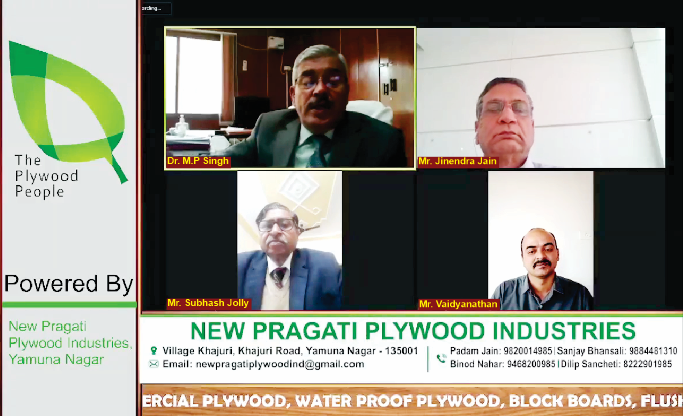
Mr. Vaidyanathan:
- It is increasingly observable that our PWI has entered a phase of having to compete with other AF/Agriwood dependent industries such as the paper & MDF. The current situation had not been envisaged prudently by PWI & its relevant Associations.
- Post 1988 Forests Policy updated (as Dr C N Pandey has been mentioning regularly), it is up to the industry to look for its raw material requirements and sources.
- It is high time PWI (big or small) & its Associations work on a war footing to organize proper RM resources for their own sector, by taking some learnings from other organised industries which are utilising AF resources.
- Whether big or small industry, this is not a time to sit back & surrender to our weaknesses. Whatever the approaches formulated – be it consortiums, buy-back agreements, catchment development, or captive development – PWI has to come together and overcome the cyclonic winds of change in the industrial scenario of a fast developing Bharat.
- It is of great pride that our PWI of Bharat, have always won over many adverse situations from time to time. And it is also hoped that the sector will jump into action this time too, for the benefit of the entire sector, our farmers and our country’s economic progress. Jai Hind!
Points from the webinar have been put very well. Time for wake up and tough decisions. A few points from my side may help.
- Small or big industry: Time to work with farmers: Individually as well collectively. Without if and Buts.
- There is no point on keeping on mentioning “Govt should do SOMETHING”.
- FIRST Thing Govt. can and should do is MAKE FARM FORESTRY PRODUCE FREE TRADE ACROSS INDIA. Once done 100% across all states, all districts, all taluka, we will go to next one
- It is survival of fittest game.
- Farmer profits by 4 things:
- QPM,
- Good price,
- Direct Purchase,
- Right n timely information
- REDUCE MIDDLE MEN TO 25%. Middlemen are for providing SERVICE ONLY. It is seen that, present middle men makes most profit in Any scenario of Shortage or surplus
- MUST: Every factory should have prominent sign board of ongoing price and allow direct farmer purchase (Amend the factory purchase and accounting procedure accordingly.
- NO Excuses please. Sugar factories buy directly.
हरियाणा प्लाइवुड उद्योगों के लिए कृषि लकड़ी की व्यवहारिक और निरंतर आपूर्ति के लिए आगे की राह
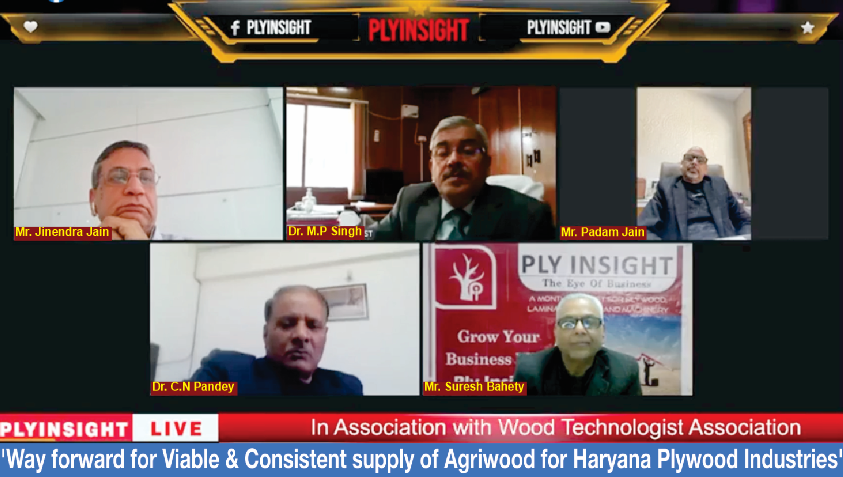
श्री सुभाष जॉली, अध्यक्ष WTA द्वारा परिचयात्मक टिप्पणी:
- लकड़ी का आयात करने वाला क्षेत्र होने के बावजूद, हरियाणा प्लाईवुड उद्योग क्षेत्र इस क्षेत्र के सबसे मजबूत योगदानकर्ताओं में से एक है। यह बहुत प्रशंसा और मान्यता का विषय है।
- हालांकि, पिछले कुछ वर्षों के दौरान, लगभग 30 प्रतिशत उद्योग बंद होने के कगार पर है। लकड़ी की पर्याप्त मात्रा में वृक्षारोपण और गुणवत्ता की कमी इसका एक मुख्य कारण है।
- यह वेबिनार संबंधित विभागों के वरिष्ठ अधिकारियों के साथ-साथ प्रमुख उद्योगपतियों, सलाहकारों और वैज्ञानिकों की उपस्थिति में इस मुद्दे को उठाने और संबोधित करने का प्रयास कर रहा है। ताकि हम बेहतर मात्रा और गुणवत्ता के लिए अपने कच्चे माल (RM) संसाधनों को बढ़ा सकें। इससे लाखों कुशल, अर्ध-कुशल और अकुशल श्रमिकों को रोजगार प्रदान करने के अलावा बेहतर घरेलू और निर्यात के अवसर भी मिलेंगे।
श्री राजेश गुलियाः
- मांग और आपूर्ति में असंतुलन होने के कारण WBI बहुत दबाव में है।
- डॉ. सक्सेना साहब से अनुरोध है कि वे वर्तमान मूल्य की स्थितियों के आधार पर समर्थन मूल्यों की समीक्षा करें। त्ड की सारी आपूर्ति किसानों से होती है। कीमतों में भारी उतार-चढ़ाव के कारण कई किसान पेड़ों को उगाने से दूर हो गए हैं। जब समर्थन मूल्य कम होता है, तो छोटे किसानों के साथ-साथ छोटे उद्योगों को भी बड़ा नुकसान होता है। लगभग 30 प्रतिशत छोटी इकाइयों को, मांग और आपूर्ति असंतुलन के दबाव को प्रबंधित करने में असमर्थता के कारण, बंद करना पड़ा है।
- डॉ जगदीश चंद्र साहब से अनुरोध। नई वन नीति लाने के बाद, उस समय के दौरान प्राप्त सर्वेक्षणों और डेटा के आधार पर लाइसेंस व्यवस्था को ढीला कर दिया गया था। यमुनानगर को लगभग 2,11,000 लाख क्विंटल लकड़ी प्राप्त होती थी। लगभग 1,50,000 लाख क्विंटल यूपी से और शेष अन्य स्रोतों से आता था। लाइसेंस इसी डेटा पर आधारित थे। अब स्थिति ऐसी नहीं है, और न ही नहीं आगे कोई आवश्यकता और आपूर्ति का अध्ययन किया गया है।
- उपलब्ध बाजार के आंकड़ों के आधार पर अब औसतन लगभग 80,000 क्विंटल ही उपलब्ध हैं। लकड़ी की इतनी कम उपलब्धता पर नई इकाइयों को लाइसेंस कैसे दिए जा रहे हैं?
- साथ ही, तत्कालीन पीसीसीएफ ने उल्लेख किया था कि अद्यतन अध्ययन किए जाने चाहिए और वर्तमान डेटा नियमित आधार पर प्राप्त किया जाना चाहिए। माननीय पीसीसीएफ साहब से अनुरोध है कि कृपया इस पर गौर करें और लाइसेंस पर निर्णय लेते समय लकड़ी की उपलब्धता की स्थिति को भी देखें।
- किसानों का नियमित प्रशिक्षण और क्यूपीएम की सब्सिडी वाली आपूर्ति पहले नियमित आधार पर होती थी। कृपया इनसे संबंधित वर्तमान स्थिति पर हमें अपडेट करें। पीसीसीएफ साहब कृपया इन पर पहल करें।
श्री जे के बिहानी:
- पिछले 5-6 वर्षों के दौरान बहुत से लाइसेंस जारी किए गए। पहले लगभग 250 इकाइयाँ हुआ करती थीं, लेकिन अब नए लाइसेंस के बाद उद्योगों की संख्या में 40 प्रतिशत या उससे अधिक की वृद्धि हुई है।
- लेकिन लकड़ी की उपलब्धता उतनी ही है।
- बैंक चरम क्रेडिट सीमा पर चल रहे हैं और इस परिदृश्य में केवल सुव्यवस्थित कारखाने ही जीवित रह सकते हैं। नकदी प्रवाह और तरलता के बहुत सारे मुद्दे हैं। कोविड ने दर्द को और बढ़ा दिया है।
- ऐसे परिदृश्य में, विभागों के लिए लाइसेंस प्रदान करने से पहले लकड़ी की उपलब्धता को देखना महत्वपूर्ण और आवश्यक है।
- इन दिनों एमडीएफ लाइसेंस भी दिया जा रहा है, जिससे स्थिति और भी बदतर हो जाएगी, जब किसान 10-11 इंच की परिधि (girth) के पेड़ों को काटना शुरू कर देंगे।
- उद्योगों की संख्या बढ़ाने के बजाय, हमें लकड़ी की उपलब्धता और उत्पादन पर ध्यान देना चाहिए।
- हमारे उद्योग बंधुओं से भी अनुरोध है कि वे कृषि लकड़ी से बेहतर उत्पादकता एवं उसकी उपलब्धता के लिए प्रयत्नशील हों और सहयोग करें।
- इस बीच, इलेक्ट्रॉनिक्स जैसे उपभोक्ता वस्तुओं के समान खेत में उगाई जाने वाली लकड़ी पर 18 प्रतिशत जीएसटी तर्कहीन है। यह छोटे किसानों पर बहुत बड़ा बोझ है, खासकर जब ऐसे छोटे किसानों से सामग्री ठेकेदारों के माध्यम से आती है।
- मैं विभागों से अनुरोध करता हूं कि जागरूकता और वृद्धि कार्यक्रमों के लिए कुछ धनराशि अलग रखें। मैं एतद्द्वारा अपने उद्योग मित्रों से भी इन पहलुओं में सक्रिय होने का अनुरोध करता हूं।
श्री जे के जैन:
- लकड़ी की उपलब्धता में उतार-चढ़ाव की समस्या दशकों से बनी हुई है. वही समस्या बार-बार सामने आती है।
- हमें मानसिकता बदलने की जरूरत है, और अलग सोच के साथ इसे अलग और नये तरह से देखने की जरूरत है।
- क्षमता तो है, लेकिन क्षमता का उपयोग न के बराबर है। क्षमता का प्रबंधन महत्वपूर्ण है।
- हमारे जैसे लोकतांत्रिक देश में, प्रत्येक राज्य की अपनी समस्याएं भी होती हैं। उदाहरण के लिए, TN से दूसरे राज्यों में यूकेलिप्टस के परिवहन पर प्रतिबंध, और कर्नाटक में यूकेलिप्टस के उगाने पर प्रतिबंध आदि।
- हमें प्राथमिकताओं पर स्वयं कार्य करने की आवश्यकता है, क्योंकि सरकारें समग्र परिदृश्य के आधार पर प्राथमिकताओं को बदल सकती हैं। यह मान लेना गलत होगा कि WBI को सरकार की ओर से हमेशा 100 प्रतिशत प्राथमिकता मिलेगी।
- हम कम उपलब्धता और अधिक उपलब्धता को स्पष्ट रूप से परिभाषित नहीं कर पाए हैं। हम दोनों ही तरफ के सिर्र्फ +- 5प्रतिशत के उतार-चढ़ाव पर प्रतिक्रिया करते हुए घबराहट दिखाते हैं।
- हमें RM के लिए काष्ठ संसाधनों के प्रबंधन के लिए नई नीति विकसित करने पर ध्यान केंद्रित करने की आवश्यकता है।
- इसके अलावा, सरकार निगम को अवक्रमित वन भूमि प्रदान करके सहायता कर सकती है, और उद्योग वृक्षारोपण के लिए निगमों के साथ शामिल हो सकते हैं।
- आवश्यकता का विशेष रूप से अध्ययन करने की आवश्यकता है। कृषि वानिकी के साथ-साथ उद्योग अपनी Captive Plantation कर सकते हैं। पुराने तरीकों से बाहर आना होगा और व्यवस्थित रूप से बदलाव लाने के लिए एक साथ एक मंच पर आना होगा।
- कीमतों में वृद्धि से सामग्री की उपलब्धता कैसे बढ़ सकती है? मैं यह नहीं समझ पा रहा हूं कि बढ़ती कीमतें कैसे अधिक RM उत्पन्न करेंगी। इस क्षेत्र में चीजें रातोंरात नहीं होती हैं। कम से कम उचित कटाई चक्र का समय तो लगता ही है। समाधान हेतू प्लानिंग करने की जरूरत है।
- हमें हरियाणा में नई उद्योग संबंधी नीति की भी जरूरत है।
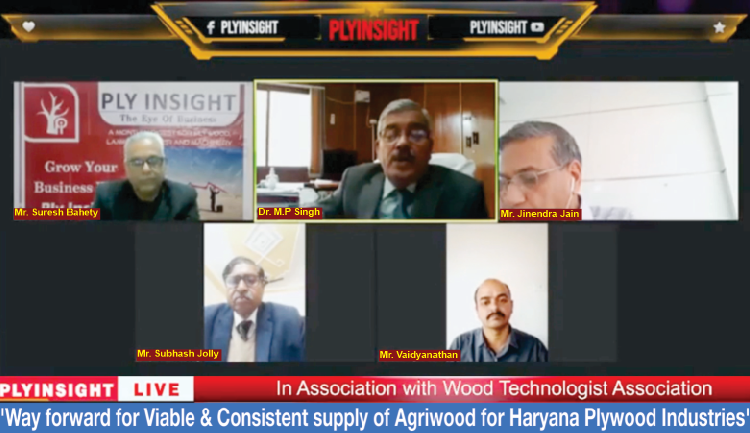
डॉ विवेक सक्सेना:
- शुरुआती दिनों में उद्योगों को एक उचित जगह और एक अच्छा वातावरण मिला। जिससे PWI फला-फूला और लकड़ी (RM) की खपत बढ़ाते हुए देश के साथ-साथ किसानों के विकास में बहुत योगदान दिया।
- उस दौरान हरियाणा यूकेलिप्टस और पोपलर प्रजातियों के परिवहन में आने वाली बाधाओं को दूर करने में सक्षम हुआ WIMCOऔर ITC जैसी कंपनियों की पहल के कारण अच्छी पौध प्रदान की गई।
-
- सभी को एक साथ आना होगा। उद्योगों द्वारा, पंचायत और सामुदायिक वृक्षारोपण को जोड़ने का लक्ष्य रखा जाना चाहिए।
- प्रजातियों का सही चुनाव, अन्य कड़ीयों को जोड़ते हुए बाय-बैक व्यवस्था आदि प्रारूप उद्योग के हितधारकों द्वारा डिजाइन की जा सकती है।
- हमें सरल और सहज भागीदारी के माध्यम से सरकार-उद्योग-किसान-अनुसंधान संस्थानों को एक साथ लाने का तरीका निकालने की जरूरत है।
- यह देखना अच्छा लग रहा है कि उद्योग अब इन पहलुओं पर एक मंच में प्रासंगिक हितधारकों के साथ, डॉ. एम पी सिंह और डॉ सी एन पांडे, और कई अन्य विशेषज्ञों के मार्गदर्शन में चर्चा कर रहे हैं।
- वन भूमि को निगमों को उपयोग के लिए सौंपने के संबंध में, -हरियाणा राज्य पहले से ही कम वन कवर वाला राज्य है और इस लिए, वास्तव में कृषि वानिकी के लिए उपलब्ध भूमि की कोई कमी नहीं है।
- श्री गुलिया द्वारा सुझाए गए RM उपलब्धता के आकलन के संबंध में, मैं डेटा के आकलन के संबंध में इनपुट के लिए तैयार हूं। हम IWST, IPIRTI और FRI जैसे संबंधित संस्थानों को भी शामिल कर सकते हैं।
- उद्योग अपनी क्षमता की आकलन और जरूरत और अन्य मुद्दों को लेकर हमारे पास आ सकते हैं।
श्री पदम जैन:
- लाइसेंस का समय गलत है। सभी जानते हैं कि हरियाणा में लकड़ी की उपलब्धता कम है।
- पहले RM की उपलब्धता का उपयुक्त अध्ययन होना चाहिए था।
- अगर ऐसा ही चलता रहा तो यमुनानगर के उद्योग धंधे बंद हो जाएंगे।
- कम परिधि वाली लकड़ी से wastage अधिक होती है। अकेले उद्योग इस समस्या का समाधान नहीं कर सकते।
- हमारे पास निर्यात के बहुत से अवसर भी हैं। हम सिंगापुर, मलेशिया और खाड़ी जैसे देशों को निर्यात कर रहे हैं। लेकिन माल ढुलाई खर्च एक बड़ी चुनौती है।
पंजाब भी अब लकड़ी की कमी का सामना कर रहा है। - लकड़ी की उपलब्धता असंतुलन का समाधान करना सबसे महत्वपूर्ण मुद्दा है।
डॉ सी एन पांडे:
- यदि हम अपनी जरूरत को माप नहीं सकते, तो हम उसका प्रबंधन नहीं कर सकते।
- कभी-कभी हमें लगता है कि यह सरकार में किसी व्यक्ति का विषय नहीं है, क्योंकि पहले किसी विभाग की इस पर विचार करने की दिलचस्पी नहीं थी।
- सबसे पहले उद्योगों की क्षमता और आवश्यकता को मापना जरूरी है।
- जैसा कि डॉ. सक्सेना ने उल्लेख किया है, उद्योग-विभागों-संस्थान-किसानों का एकीकरण बहुत महत्वपूर्ण है। हर राज्य में यह एकीकरण होना चाहिए।
- समय आ गया है कि उद्योग को भी RM विकास के लिए विभिन्न क्षेत्रों में निवेश करना होगा।
- उद्योग को किसानों के साथ अच्छे संबंध बनाने होंगे, सही कीमत चुकानी होगी और सीधे उनसे संपर्क करना होगा।
- क्यों न राज्य उद्योग क्षेत्रों के लिए AF साइकिल लेकर आएं।
- दीर्घावधि रोटेशन वृक्षारोपण की भी परिकल्पना की जानी चाहिए जैसा कि डॉ एम पी सिंह ने उल्लेख किया है फेस विनियर के लिए।
- जैसा कि उल्लेख किया गया है, हमें अल्पावधि AF रोटेशन RM के लिए लाइसेंसिंग पर वापस नहीं जाना चाहिए।
डॉ अजय ठाकुर:
- लकड़ी में सभी की दिलचस्पी है, लेकिन सुधार में किसी की दिलचस्पी नहीं है।
- लकड़ी की उपलब्धता में सुधार के लिए समन्वय और स्केलिंग की आवश्यकता है।
- जैसा कि एग्रीवुड समूह में चर्चा की गई है, औसतन 10 day light वाले एक कारखाने को 210 हेक्टेयर वृक्षारोपण के स्रोत से यूक्लिपटस की आवश्यकता होती है।
- कंसोर्टियम का दृष्टिकोण आगे का रास्ता होना चाहिए।
- हमें अपने दृष्टिकोण में अनुशासन विकसित करने की आवश्यकता है।
- हम PWI के लिए आईटीसी का एक क्लोन लगा रहे हैं जो मूल रूप से लुगदी के लिए डिज़ाइन किया गया है।
- हमने एग्रीवुड समूह में लिग्निन सामग्री पर चर्चा की।
(डॉ अजय ठाकुर ने कोरिम्बिया हाइब्रिड पर डाटा प्रस्तुत किया जो प्लाईवुड उद्योग के लिए बहुत आशाजनक है।
श्री अश्विनी कौशिकः
- हरियाणा में लकड़ी जागरूकता कार्यक्रम आयोजित किया जाना चाहिए।
- हमें यह देखने की जरूरत है कि उद्योग के लिए संबंधित विभागों से किस तरह का समर्थन जुटाया जा सकता है।
- वृक्षारोपण बढ़ाने के लिए एक साथ आना जरूरी है।
डॉ एम पी सिंहः
- हमें RM विकास और संवर्द्धन पर ध्यान देना जारी रखना होगा। यह एसोसिएशन के स्तर पर भी किया जा सकता है।
- लघु और मध्यम उद्योगों द्वारा अपनी RM आवश्यकताओं के लिए लघु संघ बनाए जा सकते हैं।
- AF पर सबमिशन कृषि मंत्रालय के पास गया है। लेकिन Tree Outside Forest उनका विषय नहीं है।
- हरियाणा फारेस्ट (FD) को बढ़त लेनी चाहिए। ToF को MoEFCC में शामिल करने के लिए प्रयास करने का यह एक अच्छा अवसर है। हम इसे दो मंत्रालयों के साथ नहीं चला सकते।
- अभी इसकी पहचान का भी संकट है। AF कृषि मंत्रालय के पास है, लेकिन जिम्मेदारी MoEFCC के पास है।
- FIPPI और PWI से संबंधित ऐसे संस्थानों के लिए भी यह अच्छा समय है कि वे इस मामले को उठाएं और इसे MoEFCC में ToF के रूप में शामिल करने का प्रयास करें।
- हम सक्रिय रूप से एक ToF अधिनियम और वुड काउंसिल ऑफ इंडिया के गठन को भी आगे बढ़ा रहे हैं, जिस पर संबंधित संघों द्वारा भी जोर दिया जाना चाहिए।
श्री वैद्यनाथनः
- श्री पदम जैन को – उद्योग अपने लिए RM संसाधन जुटाने में शामिल होने में कैसे योगदान दे सकता है?
- उत्तर – छोटे खिलाड़ियों के रूप में, हमारे पास इसमें शामिल होने के लिए जनशक्ति, विशेषज्ञता और पूंजी नहीं है। हम केवल इतना जानते हैं कि असंतुलन को दूर करने की जरूरत है। हम इस संबंध में मार्गदर्शन की अपेक्षा करते हैं।
डॉ. एम पी सिंह के प्रश्न डॉ विवेक सक्सेना से:
- हरियाणा में AF पर प्रस्तुति देने के लिए नोडल एजेंसी कौन है? क्या सबमिशन का हरियाणा में कोई असर पड़ा है? क्या वे इस मुद्दे को सुलझाने की कोशिश कर रहे हैं?
- अगर AF पर सबमिशन फोकस वन विभाग के द्वारा किया जाता है, तो गड़बड़ होगी। क्योंकि कृषि विभाग पेड़ों और ToF की देखभाल नहीं करेगा।
- लकड़ी परिषद राज्य स्तर पर बनाई जा सकती है और मिशन निदेशक सदस्य सचिव हो सकते हैं।
- मांग है लेकिन RM की आपूर्ति नहीं है। यह वास्तव में हरियाणा जैसे राज्य के लिए एक बुरी स्थिति है, जो AF में बहुत प्रगतिशील रहा है।
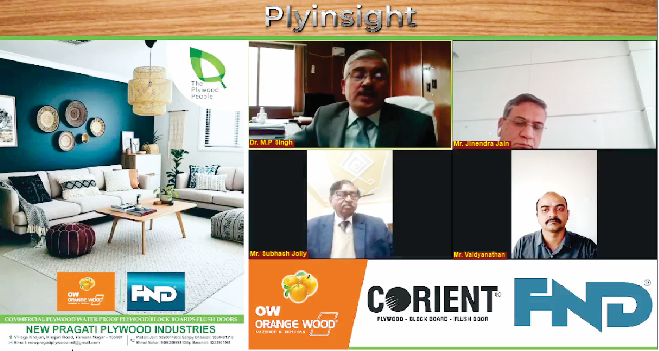
डॉ विवेक सक्सेनाः
यह एक अच्छा सुझाव है। मैं पीसीसीएफ के साथ समन्वय करूंगा और हम आवश्यक सुधारात्मक उपाय करेंगे।
डॉ. एम पी सिंह की ओर से समापन टिप्पणीः
- प्रत्येक राज्य सरकार मिशन में कुछ पैसा लगा सकती हैए क्योंकि भारत सरकार का आवंटन बहुत कम है। लेकिन राज्य अपने बजट से कुछ राशि ToF पर लगा सकते हैं और फिर हम AF को बढ़ावा दे सकते हैं।
- यह वास्तव में आश्चर्यजनक है कि हरियाणा राज्य को 90 प्रतिशत से अधिक आपूर्ति राज्य के बाहर से हो रही है।
- उद्योग को भारत सरकार के दिशानिर्देशों को नकारात्मक रूप से नहीं देखना चाहिए।WBI को लाइसेंस से मुक्त करने के लिए लोगों ने कड़ा संघर्ष किया हैए इसलिए उसे लाइसेंस के मुद्दे को वापस लाने की कोशिश नहीं करनी चाहिए।
- उद्योग आएंगेए आरएम की मांग होगी। फिर किसान भी आगे आएंगेए जब तक उन्हें बाजार मिलेगा। अबए केवल समन्वय े की कमी है।
- हरियाणा सरकार FDC से सभी हितधारकों और सदस्य सचिव के साथ एक लकड़ी परिषद बना सकती है या वे AF सबमिशन के मिशन निदेशक भी बन सकते हैं। यह किया जा सकता है। लेकिन हम वापस नहीं जा सकते और न ही मांग कर सकते हैं कि नए लाइसेंसों पर प्रतिबंध लगाया जाए।
- हम मांग करते रहे हैं कि एग्रीवुड पर आधारित उद्योगों के लिए बिल्कुल भी लाइसेंस नहीं होना चाहिए।
- और यह लगातार मांग है। सरकार ने इसे समझकर स्वीकार कर लिया है।
- जहां तक RM के संवर्द्धन का संबंध हैए हरियाणा को सक्रिय कार्रवाई करनी होगी।
धन्यवाद ज्ञापनः श्री सुभाष जॉली
श्री वैद्यनाथनः
- यह तेजी से देखा जा सकता है कि हमारे PWI ने कागज और एमडीएफ जैसे अन्य AF /कृषि लकड़ी पर निर्भर उद्योगों के साथ प्रतिस्पर्धा करने के चरण में प्रवेश कर लिया। PWI और इसके संबंधित संघों ने वर्तमान स्थिति की कल्पना विवेकपूर्ण ढंग से नहीं सोची थी।
- वन नीति अद्यतन 1988 के बाद ;जैसा कि डॉ सी एन पांडे नियमित रूप से उल्लेख करते रहे हैंद्धए यह उद्योग को ही समझना है कि वह अपनी RM कच्ची सामग्रीद्ध की आवश्यकताओं और स्रोतों की तलाश करे।
- समय आ गया है कि PWI (बड़ी या छोटी) और इसके संघ अपने स्वयं के क्षेत्र के लिए उचित RM संसाधनों को व्यवस्थित करने के लिए युद्ध स्तर पर काम करेंए अन्य संगठित उद्योगों से कुछ सीख लेकर जो AF संसाधनों का उपयोग कर रहे हैं।
- चाहे बड़ा हो या छोटा उद्योग, यह समय पीछे बैठने और अपनी कमजोरियों के सामने आत्मसमर्पण करने का नहीं है। जो भी दृष्टिकोण तैयार किया जाए, चाहे संघ की स्थापना हो, बाय-बैक एग्रीमेंट,कैचमेंट डेवलपमेंट,या कैप्टिव डेवलपमेंट – PWI को एक साथ आना होगा और तेजी से विकसित हो रहे भारत के औद्योगिक परिदृश्य में परिवर्तन की चक्रवाती बाधाओं को दूर करना होगा।
- यह बहुत गर्व की बात है कि भारत के हमारे PWI ने हमेशा समय-समय पर कई विपरीत परिस्थितियों पर विजय प्राप्त की है। और यह भी आशा की जाती है कि यह क्षेत्र. इस बार भी पूरे क्षेत्र के लाभ के लिएए हमारे किसानों और हमारे देश की आर्थिक प्रगति के लिए कार्य करेगा। जय हिन्द!

Dharmendra Kumar Daukia
Vice President
Raw Material, Green Panel Ind Ltd.
वेबिनार के मुख्य बिन्दुओं को खुबसुरती से बताया गया। समय आ गया है कि हम जागें और कड़े निर्णय लें। मेरी ओर से कुछ विचार बिन्दुः
- छोटे हों या बड़े उद्योग। समय है किसानों के साथ मिलकर काम करने का व्यक्तिगत भी और सामुहिक रूप से भी। बिना किसी किन्तु-परन्तु के।
सरकार को कुछ करना चाहिए दोहराने का कोई फायदा नहीं है। - सरकार जो कर सकती है और उसे करना चाहिए कृषि वाणिकी को संपूर्ण भारत के सभी राज्यों में मुक्त व्यापार घोषित करे। 100 प्रतिशत मुक्त व्यापार होने के बाद आगे की दिशा सोच सकती है।
- सक्षम ही सफल हो पायेंगे
- किसानों की आय में सहयोग देने वाले चार कारक हैंः
-
- अच्छी गुणवत्तापूर्ण पौध
- अच्छी कीमत
- सीधी खरीद
- सही समय पर सही जानकारी मिलना
- मध्यक्रम के व्यापारियों की जरूरत 25 प्रतिशत तक सीमित की जाये। इनकी आवश्यकता सिर्फ Service देने तक ही है। ऐसा देखा जा रहा है कि, माल की Shortage और Surplus दोनों ही स्थितियों में, middlemen ही ज्यादा कमा जाते है।
- Must : प्रत्येक फैक्ट्री को सीधे माल खरीदते हुए अपने हंजम पर कीमत का बोर्ड लगाना चाहिए (फैक्ट्री में purchase और accounting system को उसी अनुसार कृपया बदले)
- No Excuses चीनी मीलें भी तो सीधे खरीदती है।
MAXIMUM NUMBER OF INDUSTRIES SHOULD ADOPT AND COMPLIANCE THE FORMULA, AS SOON AS POSSIBLE.
Excuse me for strong words
THANKS Wood Technologist Assoc and Plyinsight for SPREADING AWARENESS

